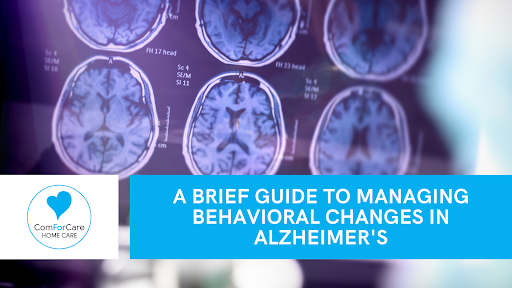

Alzheimer’s is a progressive degenerative condition affecting memory, thinking and behavior. As the disease progresses, individuals with Alzheimer’s often experience changes in how they act, which can be challenging to manage.
This brief guide will explore some helpful strategies for managing behavioral changes associated with Alzheimer’s.
People with certain genetic profiles are at an increased risk for developing Alzheimer’s disease. The two most significant genes that influence Alzheimer’s risk are APOE-e4 and Presenilin 1.
Mutations in these genes have been linked to early-onset Alzheimer’s, a rare disease that begins before age 65. In addition, other gene variations may increase a person’s risk of developing late-onset Alzheimer’s.
Certain lifestyle factors may increase the chances of developing Alzheimer’s Disease. These include diets low in healthy fats and antioxidants, physical inactivity, smoking, high alcohol consumption, and chronic stress.
The potential environmental causes of Alzheimer’s Disease have led to some intriguing conclusions. Exposure to various metals (such as aluminum), industrial chemicals (such as PCBs and formaldehyde), and air pollution may decrease the development of cognitive reserve and increase the chances of developing the disease.
You may notice the following psychological and behavioral changes:

1. Focus on Creating a Safe, Comfortable Environment
Providing a safe and comfortable home environment can help your loved one navigate the confusing symptoms associated with Alzheimer’s. Ensure that any exits and entrances to the home are locked and secure, and try to create a visually appealing space with no clutter or hazards.
Also, providing reminders and cues such as labeling items around the home, setting up warning systems if they wander away, and organizing their daily routine will help them adapt to their surroundings.
2. Stay Organized
Keeping track of medications, treatments, doctor’s appointments, special activities, and other important tasks can be overwhelming. Staying organized is essential in managing the care of someone with Alzheimer’s.
Keep all relevant information in one place and be consistent in your organization. Along with staying organized, keep copies of essential documents such as medical files, insurance forms, and living wills in an easily accessible location.
3. Ask for Help When Needed
Caring for a loved one with Alzheimer’s can be physically and emotionally taxing. It is important to remember that you don’t have to face this journey alone. Contact and involve family and friends to help support you and the affected individual. Professional support from home health aides, therapists, or respite care providers is also available.
Despite the progressive nature of Alzheimer’s, there are strategies for managing changes in behavior that can positively affect the quality of life of a person with the disease. Understanding the causes of Alzheimer’s and recognizing and driving changes in personality and behavior is essential in providing adequate care. Through what we have outlined in this article, family members and caregivers can provide their loved ones care and support during this challenging journey.
If you need a personal care service provider for your loved one with Alzheimer’s, ComForCare is here for you! We are dedicated to providing compassionate care for those with Alzheimer’s or other cognitive impairments so that you have peace-of-mind, knowing your loved one is safe and well cared for. Contact us now!
Whether your loved one needs assistance only a few hours a week or around-the-clock, our team is happy to help! Call (781) 821-2800 to learn more about the transition care services offered through ComForCare Home Care (Canton, MA).

Each office is independently owned and operated and is an equal opportunity employer.

© 2026 ComForCare Franchise Systems, LLC.